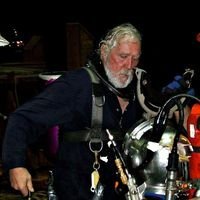New guidance for offshore commercial diving operations carried out in Germany's exclusive economic zone has been released by class society DNV GL after strong demand from stakeholders.
Until now, diving operations contracted for offshore work in German waters only had reference to inshore diving regulations, which, although mandatory, spanned significantly different types of working conditions, in harbours, lakes, and near-shore coastal waters.
There are no dedicated international or European commercial diving regulations, but standards issued by independent organizations such as the International Marine Contractors Association and the European Diving Technology Committee. The situation had become uncomfortably complex.
Speaking to IHS Fairplay, Karsten Hagenah, DNV GL’s deputy head of section for pressure and underwater technology in Hamburg, said the regulatory situation was “a mess†and that “harmonised European diving regulations are a long time overdueâ€.
He said, “Diving contractors come along with all these different regulations and say they will abide by this and that regulation, and then they would combine these with the German regulation. But oftentimes there was insufficient attention to the safety regulations, and they would often choose the lesser over the major requirements,†he said.
By way of an example, Hagenah cited the difference between some "commonly used" offshore diving regulations for a four-person team, as against German inshore diving regulations, which required only three or in some cases four people in a team. Contractors would then use the German regulations as an excuse to have a smaller team for offshore work.
“We developed this guideline because we were contacted by a lot of clients: diving companies, authorities, workers’ insurers, who all said: we need some common offshore diving regulations for the German diving sector.â€
Three fatal diving accidents in Germany in recent years were a driving force, said Hagenah, but the call had come even before, as well as during, these accidents, he said.
“The authorities were saying that they had no good guidance on how to deal with these operations, what to look out for, what the real requirements are. Commercial diving is a very complex operation, there’s a lot involved and the authorities were troubled by the lack of information available to them,†said Hagenah.
The guideline, currently available in German but with an English translation on its way, took two and a half years to develop and was supported by the ministry for economic affairs. It may become law in the future, but not just yet.
“There has been a collective decision to see how things go this diving season, and to collect experience. It might be that the next step will be to put it on a more formal footing where authorities and insurers insist that contractors follow this guideline. But right now everyone is keen to see how the guidance works – there has been a lot of pressure for it, so they want to see how it works out,†said Hagenah.
The lack of statistics and data on diving accidents, fatalities, and injuries, is an area Hagenah and his team want addressed to ensure that lessons can be learned from diving accidents.
“While we hear about fatal and serious accidents, there is a lack of data on near-miss incidents, which offer a lot of information on safety measures and requirements. These are not collected by the authorities or ministries. You only get to hear about them on a case by case basis, if a diving company shares the information during a presentation,†said Hagenah.
German windfarm fatalities
As reported in two IHS Fairplay stories in 2014, diver fatalities in Europe are coming to the attention of the authorities. However, there has been little progress on regulating diving or related accident investigations.
Kyra Richter, a spokesperson for the Diving Association (US) and a nuclear diver and diving supervisor, maintains a database of worldwide diving accidents. It reveals a rising trend of fatalities since 2000: about 27 deaths a year.
She told IHS Fairplay that the Diving Association had been trying to raise awareness about diver deaths on European offshore wind farms, where investigators had uncovered serious operational flaws.
Richter revealed that investigations into two of three fatalities that had occurred on German windfarms in the German Exclusive Economic Zone between 2010 and 2013 were still ongoing. This information remains accurate in January 2016.
Richter pointed out that the multiple diving regulations around the world are not harmonised. “If we cannot have universal standards, there should be as few as possible,†she said, explaining that “the many choices lead to manipulation by companies in order to improve the bottom lineâ€.
In Richter’s opinion, the International Marine Contractors Association standards should be global. However, the organisation told IHS Fairplay in 2014 that it represented offshore marine and underwater engineering companies and did not cover salvage operations, which “require a specialist set of skills and expertiseâ€.
Richter said varied regulations caused confusion during an accident investigation and led to inquiries “being passed around from one authority to the nextâ€.
This post was sourced from IHS Fairplay. To contact the author of this article, email Girija.Shettar@ihs.com or on Twitter: @GirijaShettar. View the original article here: http://bit.ly/1KJDa50




Recommended Comments
There are no comments to display.